UK murders spur xenophobic narratives and conspiracy theories
The murders, allegedly committed by an immigrant of West African descent, led to broader campaign of dehumanization of migrants and calls for closed borders
UK murders spur xenophobic narratives and conspiracy theories
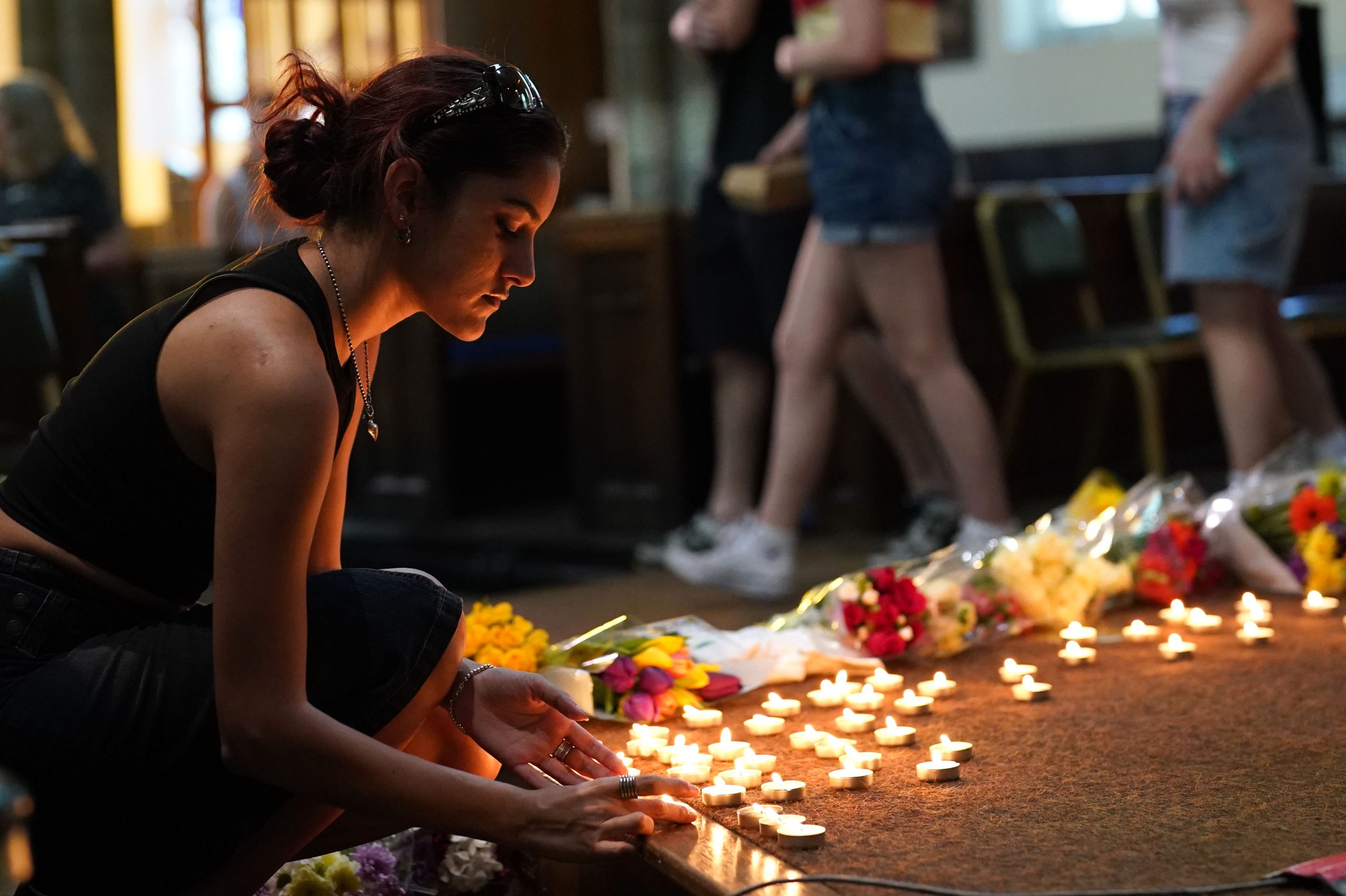
BANNER: People attend a vigil at St Peter’s church in Nottingham, UK after three people were killed in the city center, June 13, 2023. (Source: Reuters)
The murders of three British citizens, allegedly by a suspect of West African descent, have enabled those who hold anti-immigrant beliefs to fan the flames of racist and xenophobic hate.
In the early hours of June 13, 2023, Grace O’Malley-Kumar, Barnaby Webber, and Ian Coates were murdered in various locations within the city of Nottingham, England. A man named Valdo Calocane stands accused of stabbing them to death, as well as of allegedly attempting to kill three pedestrians with a van during the same murder spree. A dual citizen of Guinea-Bissau and Portugal, Calocane settled legally in the United Kingdom as a child, despite claims that he came to the country illegally. Calocane, who identified himself by the alias “Adam Mendes” during his first court appearance on June 20, has also been charged with assaulting a police constable during an incident in September 2021. A British court set Calocane’s trial date for the murders and attempted murders for January 12, 2024.
The murders – namely the revelation of the suspect’s immigration status, race, and previous criminal record – sparked a flurry of xenophobic discourse online. Narratives and conspiracy theories including calls to curb or halt immigration from non-Western countries, the dehumanization of migrants, and support for the white supremacist great replacement theory have proliferated rapidly.
This article is the first in a two-part series analyzing the narratives and conspiracy theories that emerged in the wake of the Nottingham murders. This article explores the narratives themselves, while the second piece will identify the accounts and groups responsible for driving those narratives within the UK and beyond.
Broader anti-immigrant sentiment in the United Kingdom
Immigration policy dominated much of the debate ahead of the UK’s 2016 referendum on European Union membership, commonly known as “Brexit,” with many pro-Brexit voters calling for stricter immigration laws. However, after the UK formally withdrew from the European Union on December 31, 2020, politicians and political appointees who had previously sworn to “take back control” of post-Brexit borders found the process hampered by a lack of migration policies and returns agreements with the EU. Immigration has long been a toxic political issue in the UK, and the nuances of the many narratives underpinned by xenophobia and anti-immigrant sentiment are worth further exploration.
Indeed, such sentiment appears to be on the rise both online and offline. Within the UK in 2022, there was a reported 102 percent increase of far-right activity targeting migrants, refugees, and asylum seekers, comprising 253 documented incidents. Similar increases in anti-immigrant sentiment occurred online, with a reported 149 percent increase in anti-immigrant rhetoric on far-right Telegram channels from 2021 to early 2023, according to a June 2023 report from the British human rights group HOPE Not Hate.
Anti-immigrant narratives have been fueled by influential voices in the UK, including figures in media and government. As early as 2015, the UN High Commissioner for Human Rights urged the British media to curtail its xenophobic rhetoric, identifying what he characterized as decades of “sustained and unrestrained anti-foreigner abuse” by entities like the Sun newspaper. His call for action was spurred by a Sun article referring to migrants as “cockroaches.” Individual high-ranking members of the British government have also played a substantial role in driving anti-immigrant rhetoric; for example, in late 2022, British Home Secretary Suella Braverman described the arrival of asylum seekers via small boats as an “invasion.”
Identifying dominant narratives post-Nottingham murders
To produce an initial analysis of online narratives surrounding the Nottingham murders, the DFRLab analyzed 468 comments from five YouTube videos about the case, one each from GBNews, The Telegraph, Channel 4 News, Guardian News, and TalkTV. These YouTube channels span political ideologies, with various sources (e.g., YouGov , The Guardian, and Media Bias/Fact Check) revealing that GB News and TalkTV are largely viewed as right-wing, opinion-based channels, The Guardian and Channel 4 News viewed as fairly left-wing and left-center, respectively, and The Telegraph viewed as fairly right-wing. The DFRLab scraped a maximum of one hundred comments per video on June 22, 2023, using Botster, which uses platforms’ open APIs to scrape metadata. In one instance, a video published by Guardian News yielded fewer than one hundred comments, as many of the original 358 comments posted to the video had been deleted or marked as spam; the DFRLab opted to scrape only comments that were still active.
The following comments received the most upvotes, all of which were from the GB News video:
- “You can’t deal with a problem without facing the truth. Our ‘leaders’ make me sick.” (2,171 upvotes)
- “They cannot stomach calling it terrorism, telling us he is foreign or what colour his skin is. And predictably mental health came up. What he did had nothing to do with mental health, what he did was pure evil.” (1,379 upvotes)
- “I just wish the whole country could see this report and the damage that mass migration is having on the UK…” (1,014 upvotes)
- “Let’s be honest, us British people have been a bit too accepting of these incidents as well. We have seen one of our serving soldiers hacked to death on our streets, we have seen children deliberately targeted by a bomb at a concert in Manchester and countless other incidents like the one in Nottingham, yet we haven’t really put pressure on the politicians to bring about change. Instead, we have stood back and let them and the police spout absolute garbage about how ‘our diversity is our strength’ in the face of more entirely innocent citizens having their lives taken away. Previous generations wouldn’t have stood for it and would have taken action.” (969 upvotes)
- “Poor lad was murdered by human rights lawyers.” (857 upvotes)
- “We voted for control of our borders in 2016. Weak ineffective government hasn’t honoured that vote. Brexit has been betrayed and this is the consequence.” (804 upvotes)
- “The police force here are becoming as deceitful as the FBI” (774 upvotes)
- “’We haven’t built up a problem, our politicians and media have done that for us.” (711 upvotes)
- “Not just the press nigel. The police also. We all know what this was about.” (684 upvotes)
- “A history of VIOLENCE, KNOWN TO POLICE YET LOOSE INTO THE LOCAL POPULATION…… ALL THESE MPS HAVE BLOOD ON THERE HANDS” [capitalization theirs] (649 upvotes)
The most-upvoted comments from the other videos were:
- “Will the van be charged? The reporter asked more questions about the van than the person driving the van.” (287 upvotes, Channel 4 News)
- “Ah, the Duty of Care thing. UK Government appears to have completely forgotten it’s supposed to be protecting and supporting its indiginous citizens. Above ALL ELSE, it has to do whatever is required, and is practicable, to protect us. We’re being treated like second-class, in our own country, and they know it.” (146 upvotes, TalkTV)
- “Well done guardian readers. You all helped to make this happen.” (77 upvotes, Guardian News)
- “Being a British citizen, this is upsetting and being a University teacher, I have safety concerns for all of my students .and the rest of the teenagers .. this is saddening :'( (66 upvotes, The Telegraph)
While these comments provide only a snapshot of the broader conversation surrounding the murders, the comments on these videos – which come from a variety of channels representing diverse audiences and political leanings – parroted narratives that the DFRLab traced to explicitly far-right sources. These narratives were not mutually exclusive; the DFRLab observed some overlap between them, such as calling for stricter immigration policies while accusing the UK government of not taking more proactive action.
Similar narratives were also apparent on Twitter. Using the social media analysis tool Meltwater Explore, a search for tweets containing both “immigration” and “Nottingham” originating from the United Kingdom between June 9 and June 22 yielded top keywords and phrases such as “invasion,” “evil African migrant suspect,” “endless uncontrolled mass immigration,” and “violent dangerous migrants.”
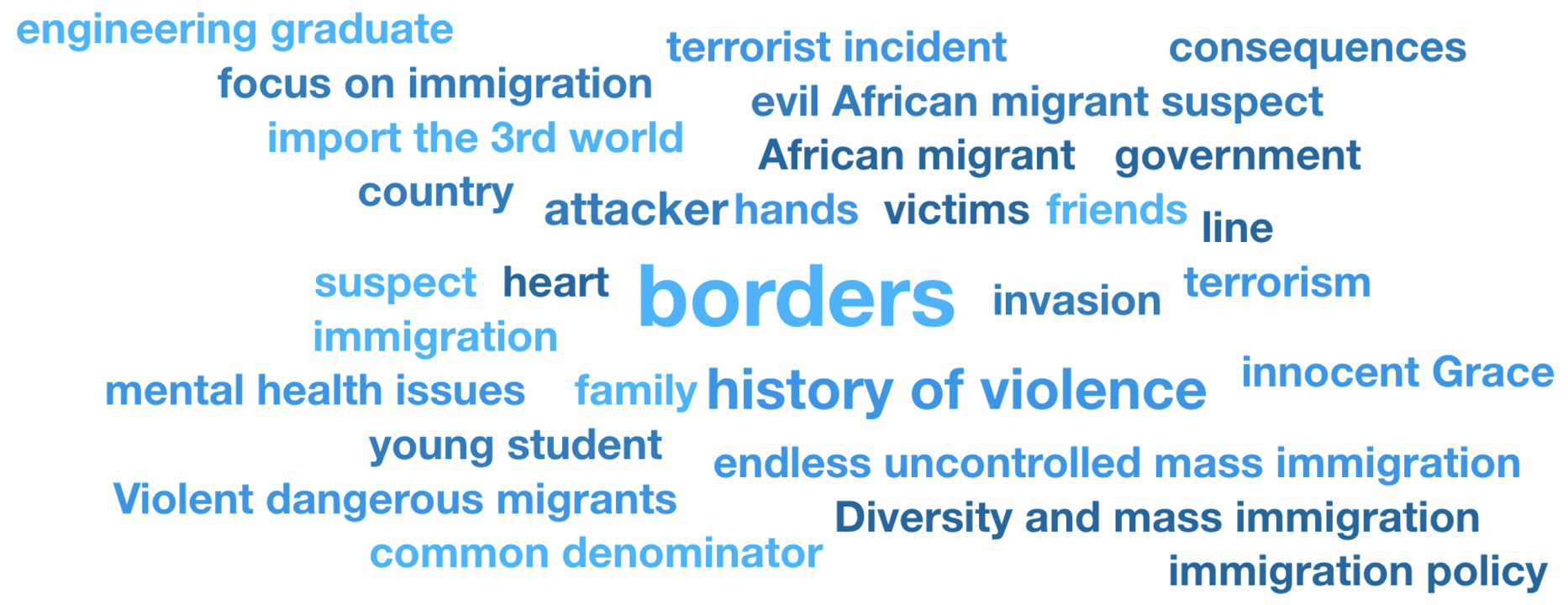
The DFRLab categorized the various anti-immigrant sentiments into three key narratives that have spread across social media platforms and messaging platforms.
Narrative 1: Dehumanizing immigrants and calling for stricter immigration laws
The immigration of people from non-Western countries into the UK became the dominant debate in the days following the murders. Far-right politicians and other high-profile accounts used the attacks to justify stricter immigration laws. For example, the National Housing Party UK, a far-right political party founded in April 2022 with the aim of ending immigration, tweeted about the Nottingham murders to promote the party’s anti-immigrant policies. “People being ran over and stabbed to death in Nottingham with 3 dead. We are being raped and murdered on a scale never seen before,” the tweet read in part, followed by a black-and-white image of a boat of migrants coming ashore accompanied with the text “INVASION – STOP THE BOATS – it’s the biggest BETRAYAL.”

Paul Golding, former member of the British National Party (BNP) and co-founder and leader of the far-right Britain First party, posted multiple tweets on June 13 and 14 claiming the victims would still be alive if “diversity” were not prioritized and if not for the UK’s “open borders.” Golding also called for the return of capital punishment for Calocane.
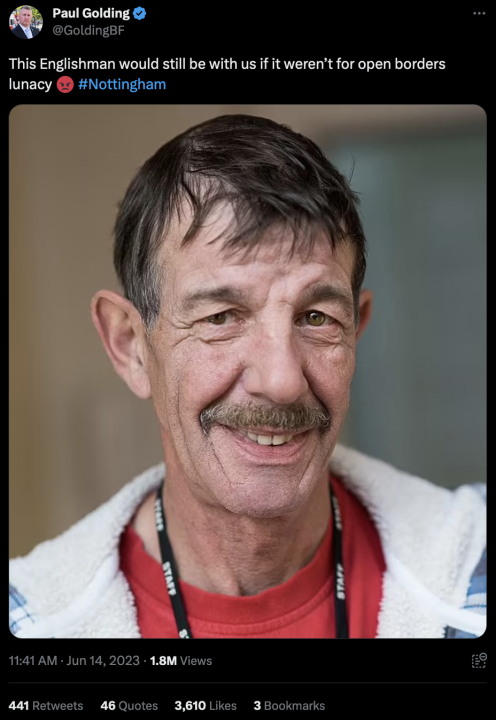
During a vigil for the victims, Barnaby Webber’s mother implored the public to “hold no hate that relates to any color, sex or religion,” a sentiment that was echoed by Grace O’Malley-Kumar’s mother. Accounts on Twitter lashed out against the victims’ mothers for their comments, replying to news outlets’ tweets featuring video footage of the vigil describing the mothers as “disgusting cowards” and “pathetically weak” for not capitalizing on the murders of their children to push for action against immigration.
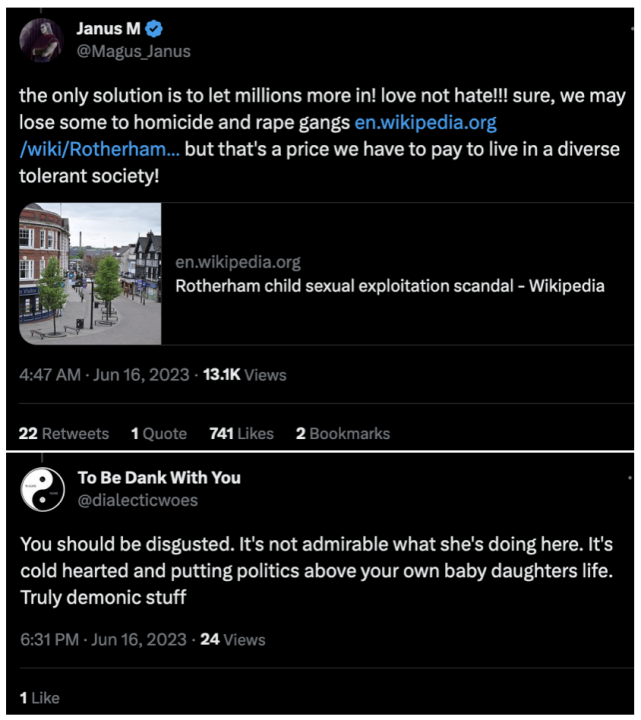
Other social media users posted tweets containing blatantly dehumanizing and derogatory language in reference to Calocane, some of which was removed by the platform. The DFRLab has chosen not to include screenshots or quote these tweets given their derogatory nature.
Narrative 2: White replacement conspiracy theories
A narrative that has mobilized multiple violent extremists to take up arms against non-white populations is the notion that populations of non-European descent that have taken residence in Western countries are replacing the majority-white populations of those countries. At least nine terrorist attacks to date have been motivated at least in part by white replacement conspiracy theories such as the Great Replacement Theory, including the 2019 Christchurch shooting, the 2019 El Paso shooting, and the 2022 Buffalo shooting.
Since the Nottingham murders on June 13, the DFRLab has identified several incidents where users have weaponized similar language to foster anti-immigrant and racist sentiment.
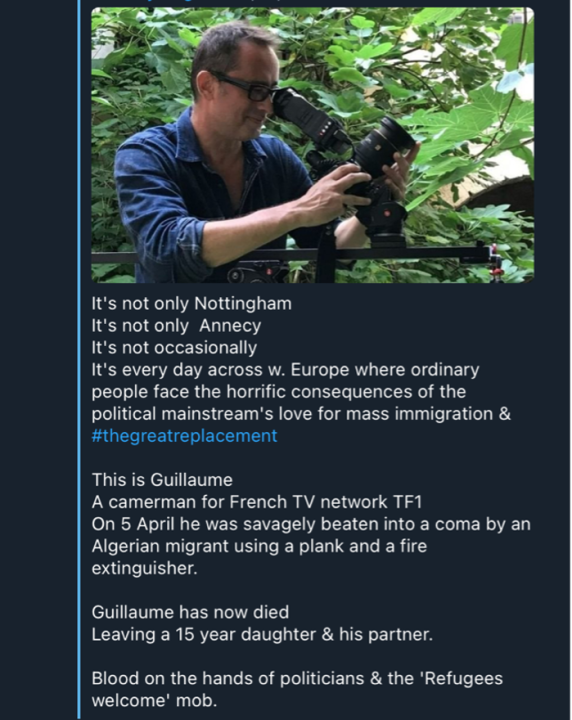
Far-right VDARE, a US-based multimedia company focused on peddling anti-immigrant rhetoric, has also used “Great Replacement” language in a Telegram post mentioning the Nottingham murders.
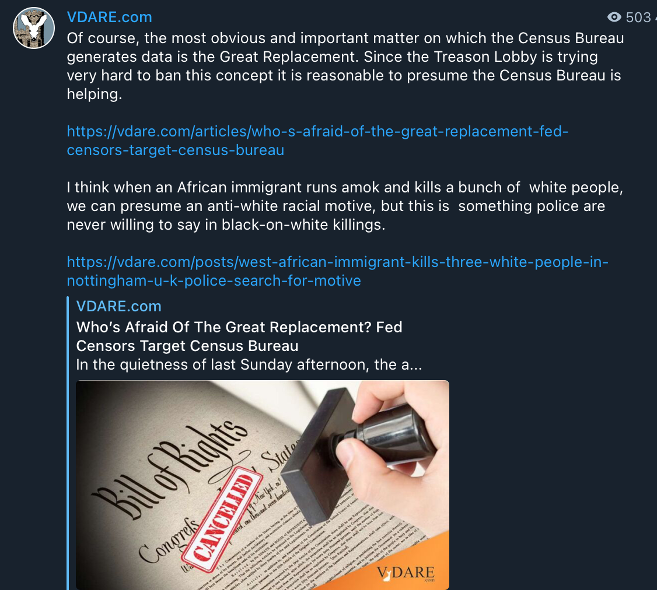
The use of the terms “invasion” and “invader” – commonplace alongside evocations of white replacement conspiracy theories – appeared frequently in analysis of the discourse surrounding the murders. For example, one UK-based far-right Telegram channel described Calocane as someone who “shouldn’t have been in the country” and characterized the attack as “an anti white terror attack by an invader.” Though the UK’s Counter Terrorism Police are working alongside Nottingham police to investigate the murders, the suspect’s motive has not yet been determined.
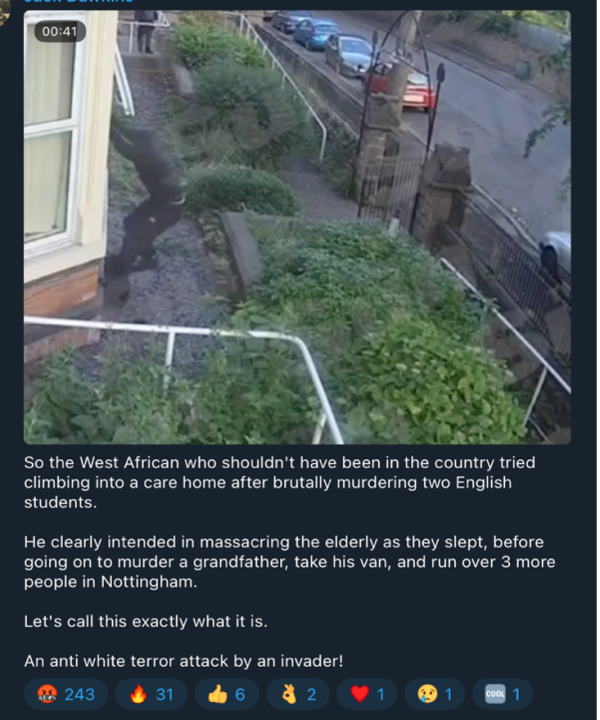
Similar sentiments were echoed on Twitter as well, including by the National Housing Party. The DFRLab observed dozens of tweets about the Nottingham murders that described immigration as an “invasion.” These tweets had echoes of language used by past violent extremists. For example, the Buffalo shooter used variations of the term “invade” (including “invasion,” “invaders,” “invaded,” etc.) almost forty times in his manifesto to describe immigration by those of non-European descent into predominantly white countries. He also specifically referenced the “invasion” of Europe, even though he is American. The increasing normalization of this language to describe non-European immigrants has clear ties to violence.
Narrative 3: Accusations against police, government, and media
Britain First’s Paul Golding targeted both government leaders and the police in his tweets about the murders. He was not alone in fixating on the latter point; many users accused Nottingham police of strategically using a photo of a white person being arrested, even though at the time of the tweet, the suspect had been described as a “Black man with dreadlocks.”
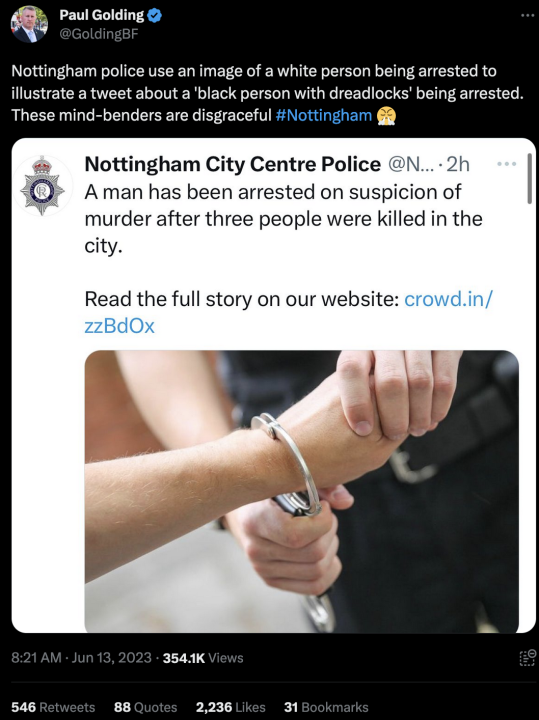
The Nottingham police’s social media activity was not the only aspect of their work that came under scrutiny. A narrative repeated across Twitter was that the Nottingham police had failed the victims by not taking action against the suspect sooner due to his alleged past criminal record. Far-right, anti-immigrant accounts shared a range of unverified criminal accusations against Calocane, many of which involved physical violence and attempted murder. According to these accounts, these incidents were purportedly known to police and the University of Nottingham’s security service – Calocane was a student at the university at the time these incidents allegedly occurred – and that both entities failed to take action against him. While all of the claims remained unsubstantiated at time of publishing, they continued to spread across social media.
Other social media users quickly became upset with the mainstream media (MSM) for not reporting on the story quickly enough or not highlighting the fact that Calocane was born in West Africa. For example, a DailyMail UK columnist blamed the media and “the Left” (capitalization hers) in her tweet the day after the attack, claiming Calocane’s migration status should have been immediately reported by the media.
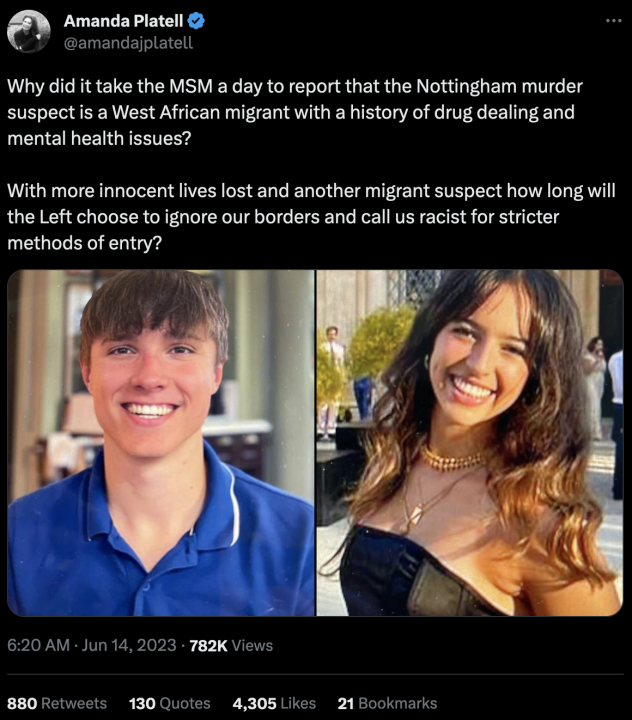
David Kurten, former UK Independence Party (UKIP) member and leader of the right-wing populist Heritage Party, tweeted that the media encourages citizens to get angry at the far right after attacks such as Christchurch but told people not to “look back in anger” after the Nottingham attack, implying a perceived left-wing bias among the media.
These narratives are just several of the talking points that have emerged since the Nottingham murders on June 13. They demonstrate the eagerness with which individuals and groups who espouse anti-immigrant beliefs capitalized upon the murders to spread xenophobic and racist discourse. Our second piece explores the actors and accounts responsible for propagating these narratives across multiple platforms.
Cite this case study:
Meghan Conroy and Tessa Knight, “UK murders spur xenophobic narratives and conspiracy theories,” Digital Forensic Research Lab (DFRLab), August 4, 2023, https://dfrlab.org/2023/08/04/uk-murders-spurred-slew-of-xenophobic-conspiracy-theories-harmful-narratives.

